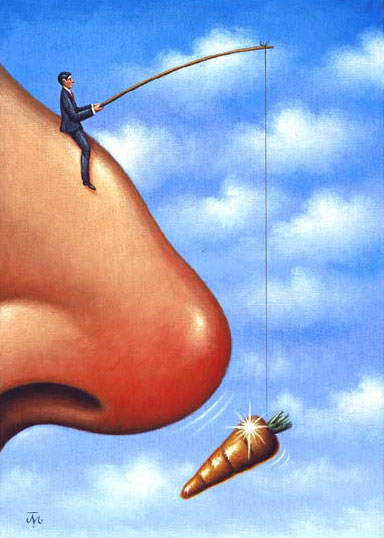Why marketing is evil
Are we approaching the final battle? Some think so, regarding movements like Occupy as the first stirrings of popular resistance to the capitalist system. Our comfortable Western world is going to be shaken by tectonic shifts in the global economy and the environment, and the result will be huge social upheaval as the old order passes away and a new one is instated.
I find Occupy bracingly idealistic, and at the same time laughably naïve. We should certainly question the system in which we find ourselves, but it’s not as simple as being for it or against it. We are all complicit. The issues are too universal to be reduced to class or generational conflict, which is the territory where movements like Occupy tend to end up. The rhetoric is a powerful motivator, but can obscure the very complexities we need to address.
Having said that, we do all have choices to make, and one of the most important is the work that we do. So where does marketing fit into the picture? Can one be a marketer and also on the side of progress? Is marketing part of the solution, or part of the problem?
Case for the prosecution
One way late-stage capitalism sustains itself is by driving overconsumption. Once markets mature and competition intensifies, it becomes increasingly difficult to sell people more stuff and secure the holy grail of growth. Over time, goods tend to become commodified – that is, broadly similar to each other, with price the only factor in a buying decisision.
Firms respond, in part, with novelty: making things new again, and cultivating the desire for them afresh. We can see this very clearly in cultural industries such as fashion and pop music, where new looks and acts appear each season. However, in recent decades the same philosophy has invaded the supermarket aisles. More and more new products are launched, while existing ones are endlessly reinvented and repackaged so they can be repositioned as ‘new and improved’, or a subtler variation on the same message. In the B2B arena, we see a similar phenomenon under the catch-all banner of ‘innovation’.
To convince people to buy their new stuff, firms turn to marketers. On one level, marketing is simply the channel through which they inform people about their products. But it is also marketing, considered in its broadest sense, that gives a physical product or service its aura of desirability. As marketers, we craft the messages and images that (we hope) convince people they need a particular product in their lives – either instead of, or as well as, some other product.
If changes are indeed coming to our society, one of the most significant might be a radical downsizing of material expectations. We may have to make do with less, in many ways: lower incomes, part-time hours, fewer holidays, later retirement, smaller carbon footprint and so on. In other words, we’re going to buy less stuff.
Marketing encourages the precise opposite, cultivating behaviours and mindsets that are completely at odds with the way our society is heading. It cultivates desire, fuels dissatisfaction and drives overconsumption; it can only encourage us to buy more.
 Overconsumption isn’t just a moral or psychological problem. It has many real-world impacts. At the personal level, it stops us building up a savings ‘cushion’ that would protect us from economic chaos or reduce our dependence on work. It diverts resources away from progressive actions we could take, such as giving to charity or simply refraining from spending. If we get sucked into the cycle of ‘getting and spending’, it upsets our work/life balance. And at a more universal level, it accelerates the destruction of the environment and reinforces the acquisitive, materialistic side of our culture. When we overconsume, we invest in the present rather than the future – in a very literal sense, we buy into the status quo.
Overconsumption isn’t just a moral or psychological problem. It has many real-world impacts. At the personal level, it stops us building up a savings ‘cushion’ that would protect us from economic chaos or reduce our dependence on work. It diverts resources away from progressive actions we could take, such as giving to charity or simply refraining from spending. If we get sucked into the cycle of ‘getting and spending’, it upsets our work/life balance. And at a more universal level, it accelerates the destruction of the environment and reinforces the acquisitive, materialistic side of our culture. When we overconsume, we invest in the present rather than the future – in a very literal sense, we buy into the status quo.
Seen in this light, marketers are not agents of change in a deep sense. We may fetishise novelty, but ultimately we shuffle the pack without changing the game. By encouraging consumption and spending, we keep people stuck in the groove where capitalism wants them to be. Basically, we’re not helping.
The libertarian defence
The argument that marketing or advertising harms society is not new. When it is wheeled out (which happens regularly, as in this crusading George Monbiot piece), marketing professionals usually respond with a well-practised line centred on freedom of speech and freedom of choice. We live in a democracy. Marketers are free to say what they want, and consumers are free to buy what they want. And besides, who will decide what’s fair, and what isn’t? Left-wing newspaper columnists?
The most advanced and nuanced form of this argument that I have seen is proposed by Jeremy Bullmore in his essay Competitive Persuasion. He cites the democratic system of government, and the adversarial system of justice, to argue that ‘competitive persuasion’ is the best way we have of presenting alternatives and allowing the ‘audience’ (voter, juror, consumer) to ‘read, absorb, reject, modify – and make up [their] own minds’.
Challenging the complaint that advertising should be ‘balanced’ or ‘more truthful’, he presents this magnificent summary of the ‘free choice’ position:
I believe that competitive persuasion leads to a discriminating, alert, intelligent society in which each member can arrive at his or her own decisions – whether or not they seem rational, sensible and correct to any self-appointed protector.
Note how far Bullmore is going with this. For him, it’s not just a question of marketing not being harmful – he’s actually suggesting it’s an active force for good. It keeps society, and the individual, sharp. If it did not exist, he implies, it might be necessary to invent it.
Expressed so eloquently, the libertarian argument takes on an almost Classical symmetry, as if it were some sort of natural law. But seductive ideas are not necessarily right. As Paul Krugman noted, reflecting on economists’ failure to predict the financial crash of 2007:
The economics profession went astray because economists, as a group, mistook beauty, clad in impressive-looking mathematics, for truth… economists will have to learn to live with messiness.
The truth is that we all have to live with messiness – and we can’t use highflown ideas to excuse the manifest consequences of our actions.
Unequal power
The natural law that Bullmore’s competitive persuasion most resembles is natural selection. Equal players duke it out on a field that is the same for all; the strong prevail and the weak fail. As a result, the community as a whole grows stronger over time. No external authority, whether God or the ASA, is required to regulate the system.
 This is an ‘in principle’ argument, suited to an idealised democracy populated by equal actors with equal power and equal rights. But even though we may be equal in law, or philosophy, we are not equal in reality. As Adam Curtis argued in All Watched Over by Machines of Loving Grace, the ‘balance of nature’ is only a theory: in reality, ecosystems are in constant flux and there is no such thing as a ‘self-regulating system’. Macroeconomic events since 2007 have comprehensively demolished the laissez-faire concept of the benign ‘hidden hand of the market’, but many still cling to it for ideological reasons.
This is an ‘in principle’ argument, suited to an idealised democracy populated by equal actors with equal power and equal rights. But even though we may be equal in law, or philosophy, we are not equal in reality. As Adam Curtis argued in All Watched Over by Machines of Loving Grace, the ‘balance of nature’ is only a theory: in reality, ecosystems are in constant flux and there is no such thing as a ‘self-regulating system’. Macroeconomic events since 2007 have comprehensively demolished the laissez-faire concept of the benign ‘hidden hand of the market’, but many still cling to it for ideological reasons.
In nature, the economy and society, power is unevenly distributed. The mark of civilisation is that we can and do intervene to help the weakest among us. Only the staunchest conservative advocates removing the safety net of social security. The rest of us understand that society will not regulate itself, and that it is weakened, not strengthened, when it neglects those in need.
Powerful speakers, susceptible listeners
Power is unequal in culture too. In terms of marketing communication, the result of inequality is that some ‘speakers’ are much more powerful than others. It’s not a question of ‘each member’ of a society using their individual voice, but about powerful, extensive alliances crafting the most insidiously persuasive messages they can – then using vast resources to hammer those messages home as forcefully as possible.
Similarly, some ‘listeners’ are more susceptible to commercial messages than others. Try watching a commercial TV channel with a five-year-old for half an hour and you’ll soon have first-hand proof. If they’re bright and inquisitive, you might also have to explain what adverts are for, using their vocabulary – which is a truly sobering experience.
But it’s not just kids. Consider the effect of cynically alarmist ads on the worried elderly, or how anorexic women feel when they look at stick-thin clothes models. And what about viewers with dementia, or learning difficulties? As in many other areas of life, it’s easier not to think about it.
 Of course, the outcome of exposure to advertising may not be a purchase; the little girl might not get her Lelli Kelly shoes, however much she asks. But the absence of a financial transaction doesn’t mean we can take comfort that the ad ‘didn’t work’ or ‘had no effect’. Indeed, this is precisely the point of what is usually called ‘brand-building’ – to lay the psychological foundations for a purchase, or cultivate latent loyalty, even if there is no immediate decision to buy.
Of course, the outcome of exposure to advertising may not be a purchase; the little girl might not get her Lelli Kelly shoes, however much she asks. But the absence of a financial transaction doesn’t mean we can take comfort that the ad ‘didn’t work’ or ‘had no effect’. Indeed, this is precisely the point of what is usually called ‘brand-building’ – to lay the psychological foundations for a purchase, or cultivate latent loyalty, even if there is no immediate decision to buy.
It’s disingenuous for marketers to say people can ‘just ignore’ their messages. Humans aren’t robots; we always respond to what we see and hear, even if only in thought. The effect of seeing an ad and ‘ignoring’ it to the best of our abilities is not the same as not seeing it at all. And advertising is more and more pervasive; we very often encounter it against our will, in an increasing number of situations.
To sum up: we should all be free in principle to say what we want, and ignore what we want. But resources matter, as do circumstances; the playing field is not level. In a world of entrenched inequality, to champion freedom is to endorse vested interests.
The neutral-channel defence
The next line of defence is the idea that marketing is a tool: a means to an end, not a ‘thing’ in itself. As a neutral channel, it can’t be held accountable for the uses or abuses to which people put it.
That’s the argument put forward in this piece by Ed Gillespie (which responds to the Monbiot article cited above). As he says:
Advertising in itself is not evil. It is just communication. As I think a former campaign director at Greenpeace once put it: “Creative communication is like a kitchen knife – you can use it to prepare a beautiful, delicious meal. Or you can use it to stab your wife.” We can use influencing techniques with insight and integrity to inspire a better world. Or we can use them to flog catfood. But it is a choice.
As with Bullmore’s ‘each member of society’, the argument is seductively symmetrical. It sounds like it should be right. In terms of its logic, it’s rather like the gun-lobby line that says ‘guns don’t kill people, people kill people’. Or, as Morpheus puts it in The Matrix, ‘everything begins with choice’.
 However, the phrase ‘just communication’ is deeply disingenous. We come back to the issue of inequality, circumstance and control of resources. You and me chatting in the pub could feasibly be described as ‘just communication’. A multi-million pound ad campaign for SUVs is not ‘just communication’; it differs by nature, not just degree. If you can buy a gun, and I can buy a gun, we can have a duel. But if I can afford to hire an army and buy them all guns, and you can’t, the result will be a massacre.
However, the phrase ‘just communication’ is deeply disingenous. We come back to the issue of inequality, circumstance and control of resources. You and me chatting in the pub could feasibly be described as ‘just communication’. A multi-million pound ad campaign for SUVs is not ‘just communication’; it differs by nature, not just degree. If you can buy a gun, and I can buy a gun, we can have a duel. But if I can afford to hire an army and buy them all guns, and you can’t, the result will be a massacre.
Similarly, the rhetorical ‘we’ conceals the devil in the detail. ‘We’ as a collective society do have a ‘choice’ in a philosophical sense. But that choice is only enacted at the level of corporate entities who use marketing services. Do they generally ‘use influencing techniques with insight and integrity to inspire a better world’? Well, some do, but most don’t. (Although they’d probably claim that they do.)
If marketing really is just a tool, then anyone can use it, including ‘good’ organisations like Greenpeace. But ‘bad’ ones with bigger cash piles (News International immediately springs to mind) can use it far more powerfully and extensively. He who pays the piper calls the tune, and marketers are pipers extraordinaires. We follow the money – and if we don’t, we know that someone else will, so at the end of the day the societal outcome will probably be the same.
The supply-and-demand defence
A similar defence is that marketers simply connect supply (goods and services) with demand (purchasers). People want lots of things they don’t have, or haven’t heard of yet, and we just hook them up. We are selfless servants; vectors of others’ desires.
That might make sense to an economist, but not to a marketer. Any self-respecting adman knows that advertising derives its powerful emotional charge from the generation of demand: making people want something by aligning or allying it with a particular emotion.
Here’s how Richard Layard puts it, considering the impact of advertising on happiness:
Advertising is clearly meant to change our values – how we like one product compared with another. But does the advertising experience make us happier? If advertising simply provided information, it would be hard to object. But a lot of advertising makes us feel we need something that we previously didn’t need. The advertiser may have only wanted us to buy his brand rather than another. But the overall effect is to make people want more.
The most common advertising device is to show us that people of our sort have this thing – on the assumption that we will want to conform. The advert becomes a self-fulfilling prophecy. The most serious effect is on children… [who] get the idea that they need this vast array of spending just to be themselves.
Richard Layard, Happiness, pp160–161
The product itself must offer some sort of benefit, of course – marketing isn’t a magic wand that can sell snow to Eskimos. But once you have an OK product, the way to shift it is by convincing people they can’t live without it. It would be a foolhardy marketer who just put the features of the product out there, in the expectation that the market would do the rest. Once we get beyond basic necessities, making a sale means generating demand.
Granted, the customer may feel that the product fulfils a need that came from themselves. But the whole affair is predicated on and motivated by companies’ thirst for profit – not some sort of altruistic quest to bring people things they somehow need or deserve.
The aesthete’s defence
Having covered the main moral and philosophical points, we arrive at what we might call intellectual coping strategies – things we tell ourselves to sleep better at night.
The aesthete plays up the creative side of marketing in order to position it as an art form. ‘I know we’re cogs in the machine,’ they argue, ‘but look at the beautiful things we make.’ For the aesthete, marketing’s potential to entertain, edify or otherwise enrich our culture can outweigh, or at least mitigate, its deleterious effects. Their stance is implicit rather than explicit; we can infer it from behaviours such as pursuing their craft (writing, photography, design) as a hobby, or curating a tumblr of ‘great work’. At a communal level, awards and awards ceremonies are a godsend, offering validation and the reassurance of a like-minded peer group.

Garland: 'What do you do for a living?' Barton: 'I'm not sure any more. I guess I try to make a difference'
Can we separate the art of marketing from the commerce? I don’t think so. Even though awards usually focus on the inherent merit of an ad rather than the results it generated, we can’t escape the underlying motivation. Advertising clients are not like painters’ patrons, generously supporting the creation of beauty. They’re paying to shift unit by any means necessary, and creatives are grist to the mill – like idealistic writer Barton Fink being mercilessly co-opted by studio boss Jack Lipnick and forced to write wrestling movies.
But we can’t take comfort from our oppression. Without the discipline of the brief and the commercial goal, advertising is shallow and facile – little more than intellectual masturbation. For proof of this, check out the wilder fringes of the Chip Shop Awards (entries need not necessarily have ‘run’, or even been commissioned by a client).
Of course, there may be aspects of marketing that have aesthetic value in themselves: the writing, the photography, the typography. But those things would be beautiful anyway. Marketing can’t take the credit.
‘Beauty is truth, truth beauty,’ as Keats put it. Marketing may or may not be truthful, and even when it’s beautiful, there’s always something else besides. Strip away the cleverness and the core mechanic is a sort of psychological bait and switch, designed to convert an audience emotion (intrigue, amusement, recognition, self-regard) into desire. From this perspective, marketing is closer to pornography than it is to art.
In James Joyce’s A Portrait of the Artist as a Young Man, Stephen Dedalus proposes an aesthetic theory that distinguishes between two types of art. Intellectual or ‘high’ art induces a state of static reflection, while physical or ‘low’ art is kinetic, producing feelings of revulsion (‘away from’) or desire (‘towards’). Marketing, with its ever-present motive of pushing the reader towards a purchase, can only aspire to be low art – at best.
The scholar’s defence
This defence consists of concentrating on the theory and practice of marketing to hollow out a little space where the marketer can live at one remove from commercial reality. The scholar keeps his eyes down on his work, so he doesn’t have to look up at its consequences. (It’s basically what I do on this blog.)
‘I’m really more interested in how and why things work,’ postures the scholar. ‘Others may profit from what I do, but I’m all about the ideas behind it.’ The marketing scholar is generally more realistic and reflective than the aesthete, which may be why more experienced creatives gravitate towards this persona as they age. At the extreme, they can become a contrarian – someone so secure in their beliefs and/or income that they can bite the hand that feeds (or at least pretend to).
We might also add two more personae that are common to every walk of life: the careerist, who regrets the negative consequences of their actions but still looks out for number one, and the out-and-out cynic, who just doesn’t care.
What might change?
The case for the prosecution is powerful, but the jury is unlikely to convict. Marketing isn’t going away. So what can we do? What about changing the system from within? Couldn’t we just be a bit nicer, a bit less manipulative?
Futerra, the agency run by Ed Gillespie (who I quote above), states that its mission is ‘to make sustainable development so desirable it becomes normal’. That’s laudable, and I would much rather Futerra existed than not. It is a force for good. But it is still dependent on paying clients. If businesses did not see value – commercial value – in the concept of sustainability, they would not be paying to communicate it. Marketers are not in the driving seat; even the worthiest piper is still a piper.
In fact, it’s hard to see how marketing as we understand it could be a force for genuine progress in society; the best thing would be for talented and powerful marketers to renounce their profession.
So we’ll just have to wait for our clients to change. But that’s a slow and arduous process, because as soon as progressive ideas enter the capitalist arena, they’re instantly corrupted and co-opted by The Man and turned into weapons of profit.
If the financial crisis of 2007 and its aftermath taught us anything, it’s that we will be waiting a long time for big businesses like banks to take true social responsibility. The best we can hope for is ‘caring capitalism’, where an ‘ethical’ business like The Body Shop deigns to invest some of its profits in social projects. But even this is profoundly cynical; the motive is less on altruism than on burnishing public image to gain a competitive edge. Marketers play their part by blurring the line between value and ‘values’, converting positive actions into bankable brand equity.
Why I wrote this post
You’re probably wondering why I wrote this piece – gnawing on the hand that feeds for several thousand words. The main reason is that I know, deep down, that I can’t really reconcile my political beliefs with the work I do. Most of the time I just try not to look at the elephant in the room, or I draw comfort from telling myself that I agree with the robust pro-marketing opinions I see on the internet. Just this once, I thought I’d make the effort to explore the arguments for and against – and, I have to say, I’m not heartened by what I’ve discovered. Looks like I’m one of the bad guys…
Tags: Adam Curtis, Advertising, aesthetics, Barton Fink, Capitalism, Chip Shop awards, Competitive Persuasion, Ed Gillespie, Futerra, George Monbiot, Jack Lipnick, James Joyce, Jeremy Bullmore, John Keats, Libertarianism, Marketing, natural selection, Occupy, Overconsumption, Paul Krugman, Richard Layard, Stephen Dedalus, The Body Shop
